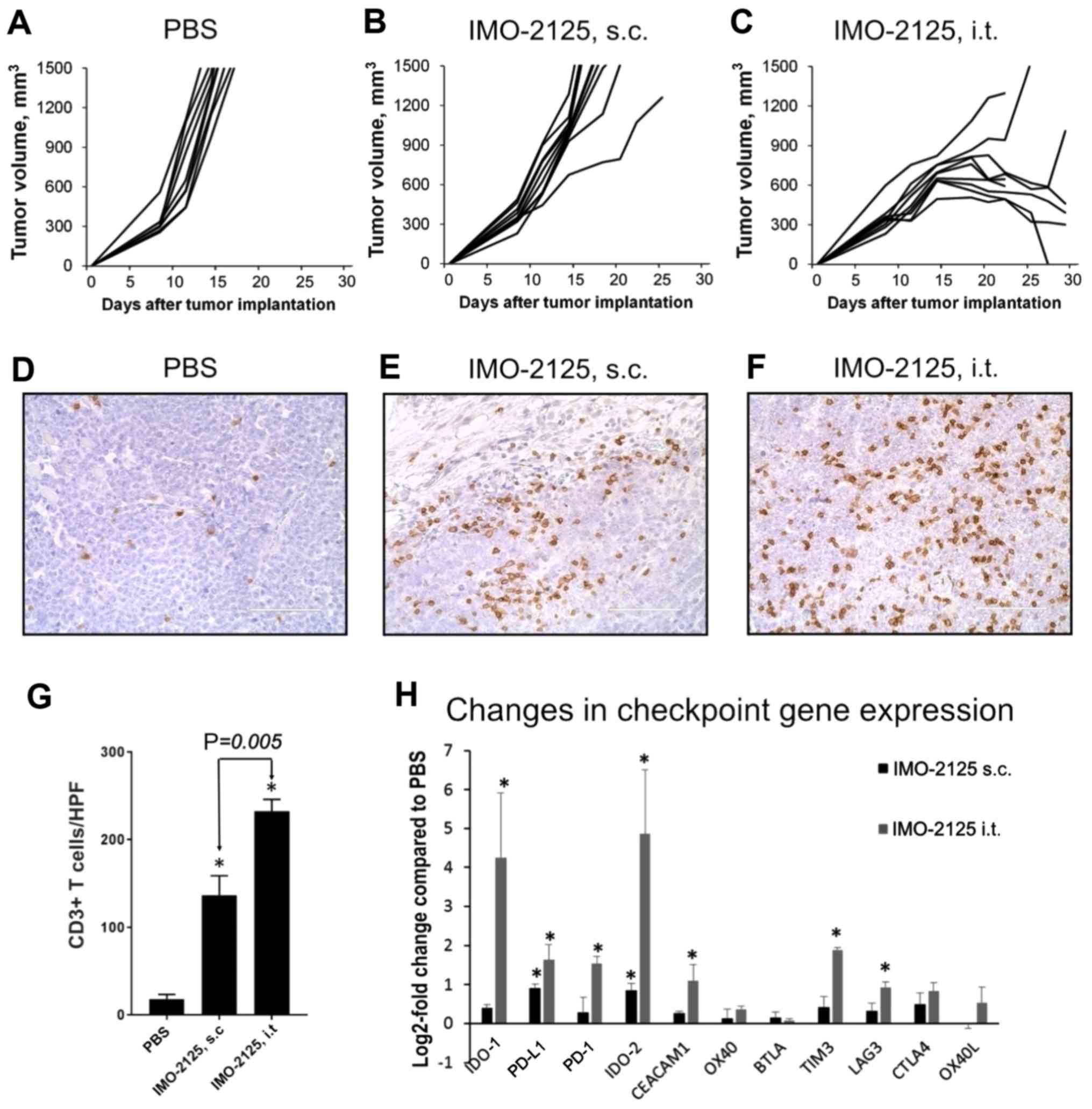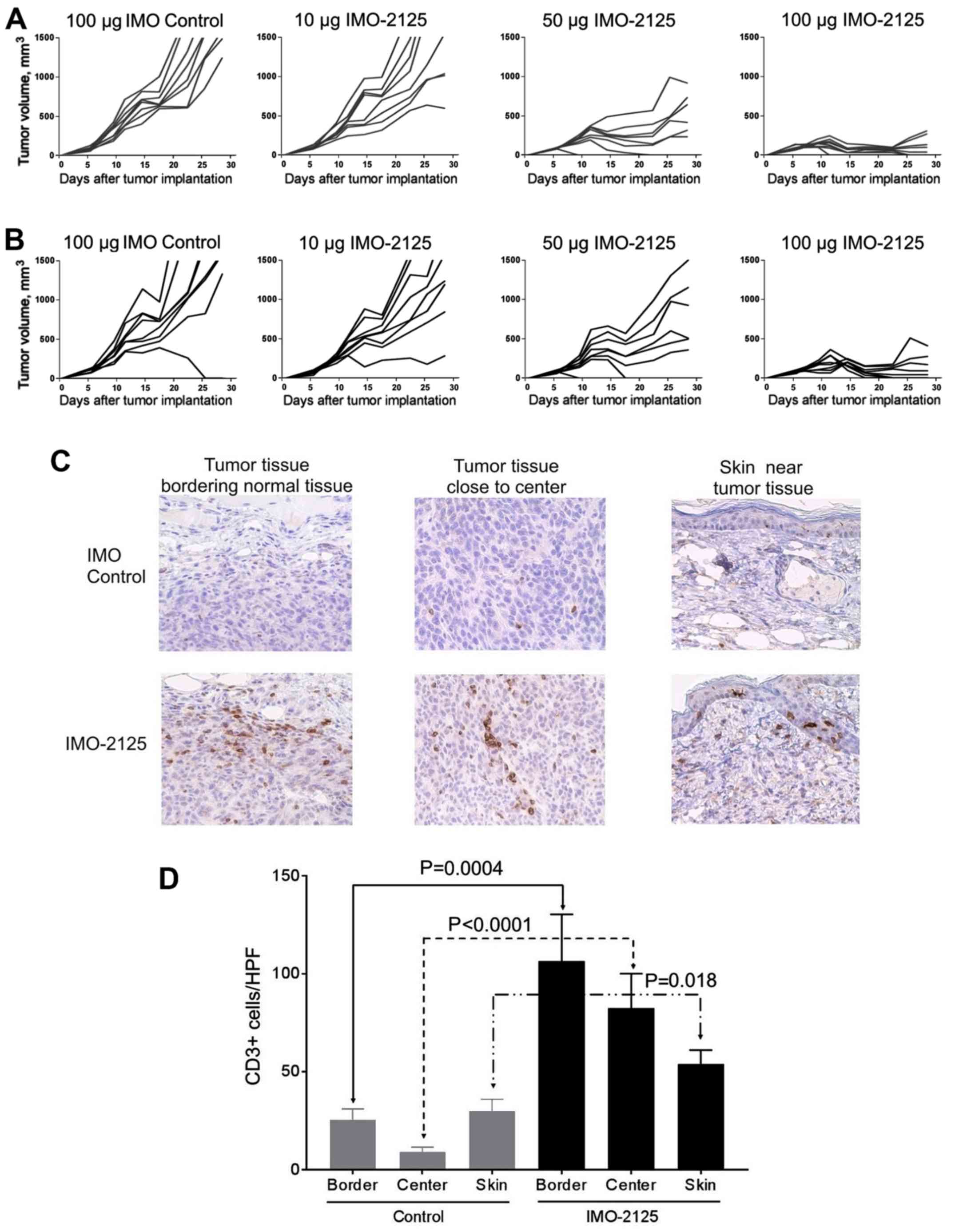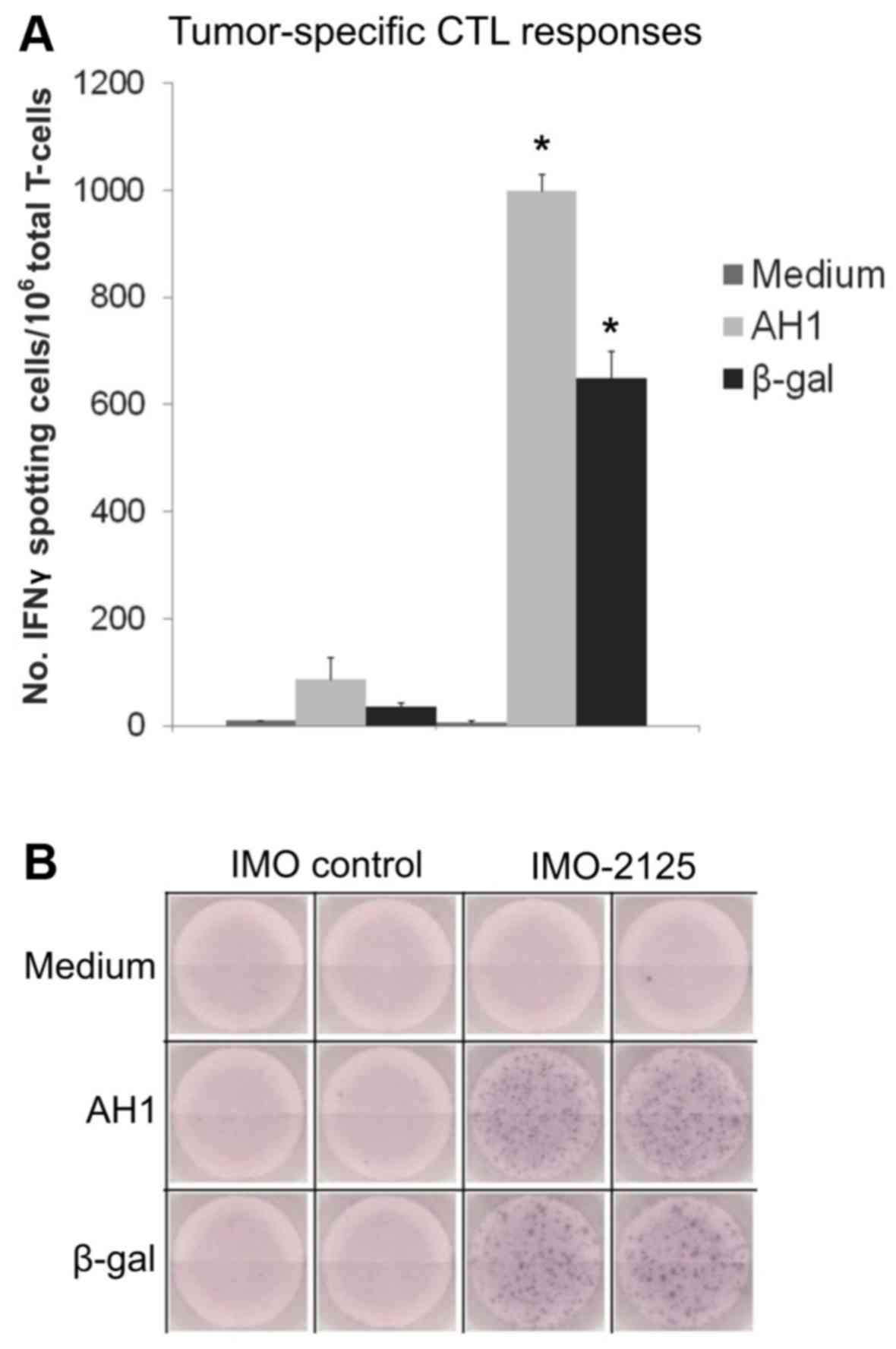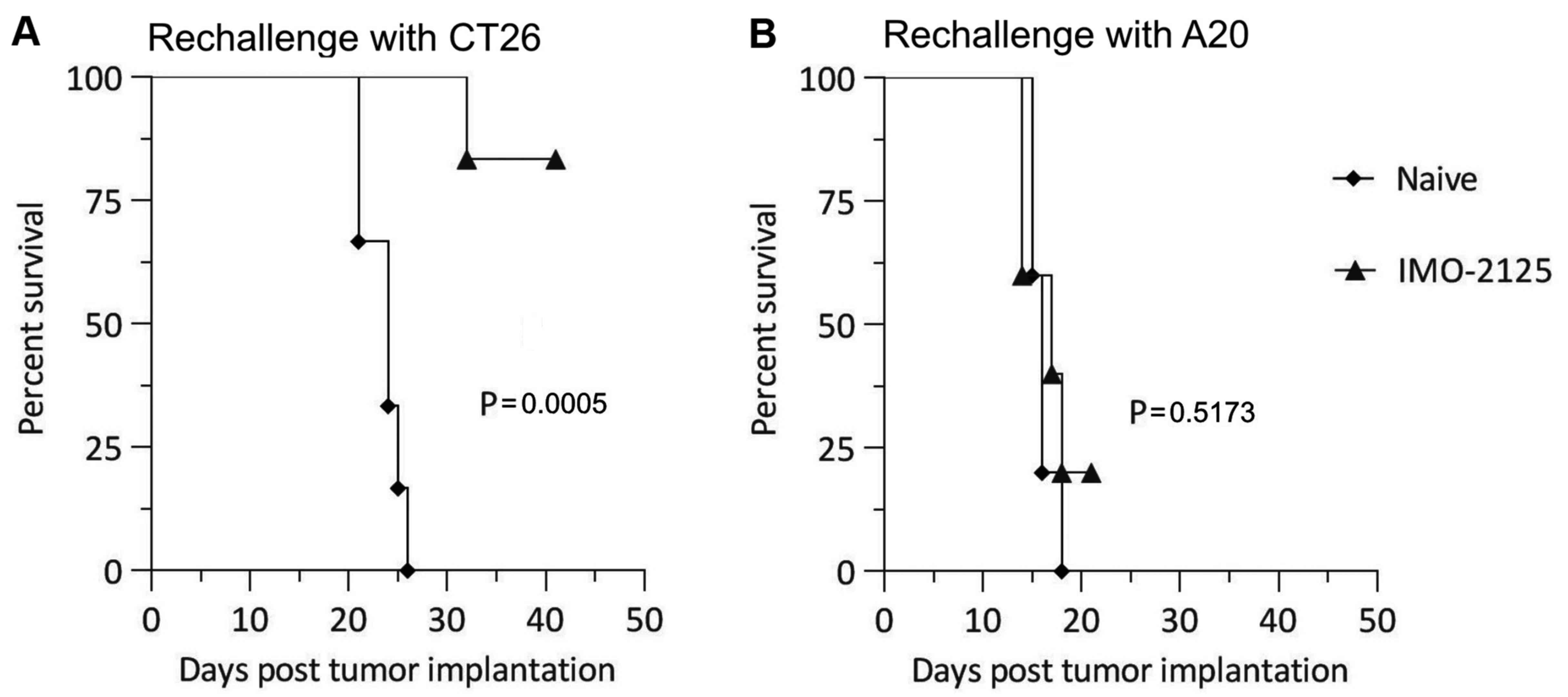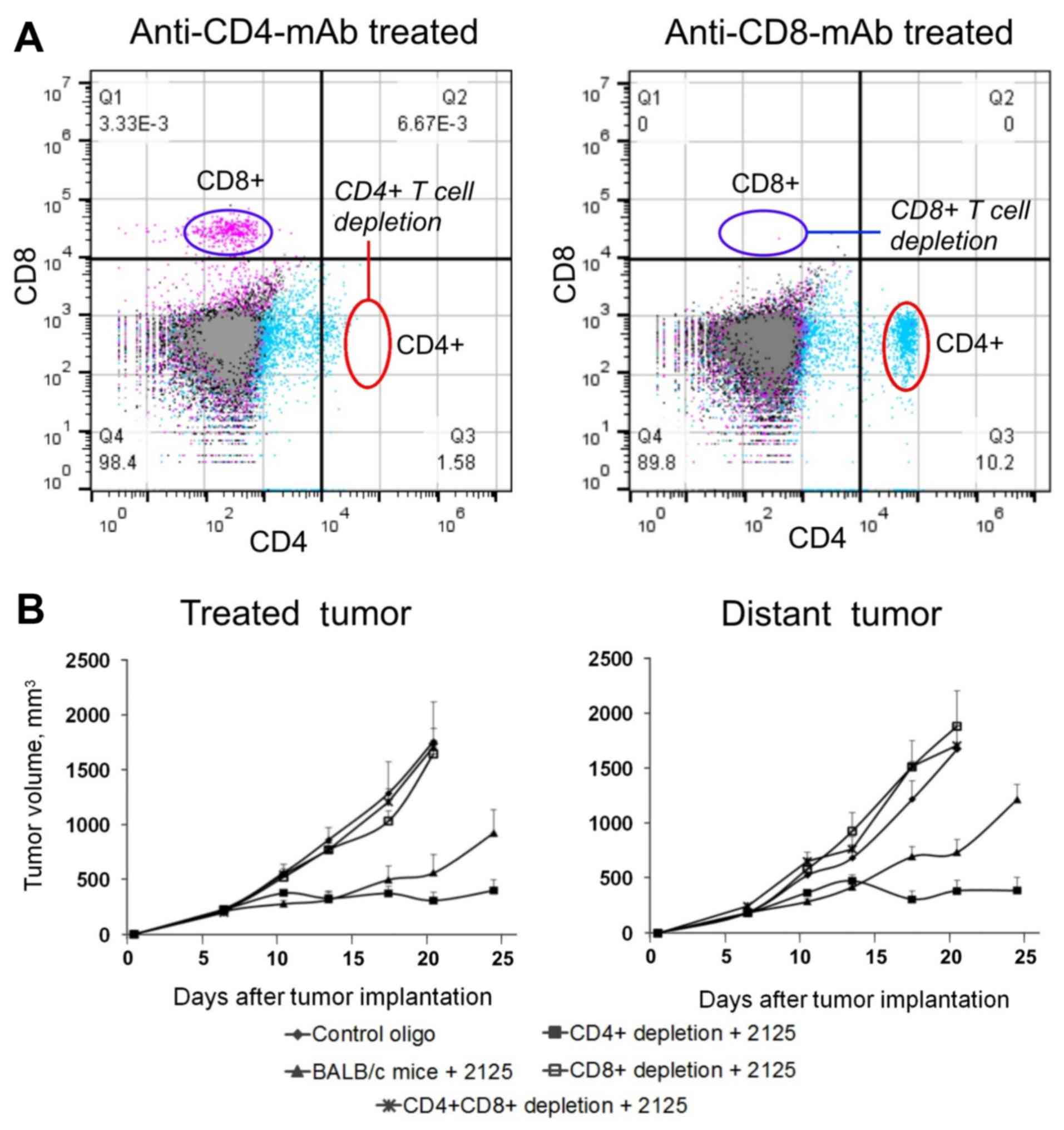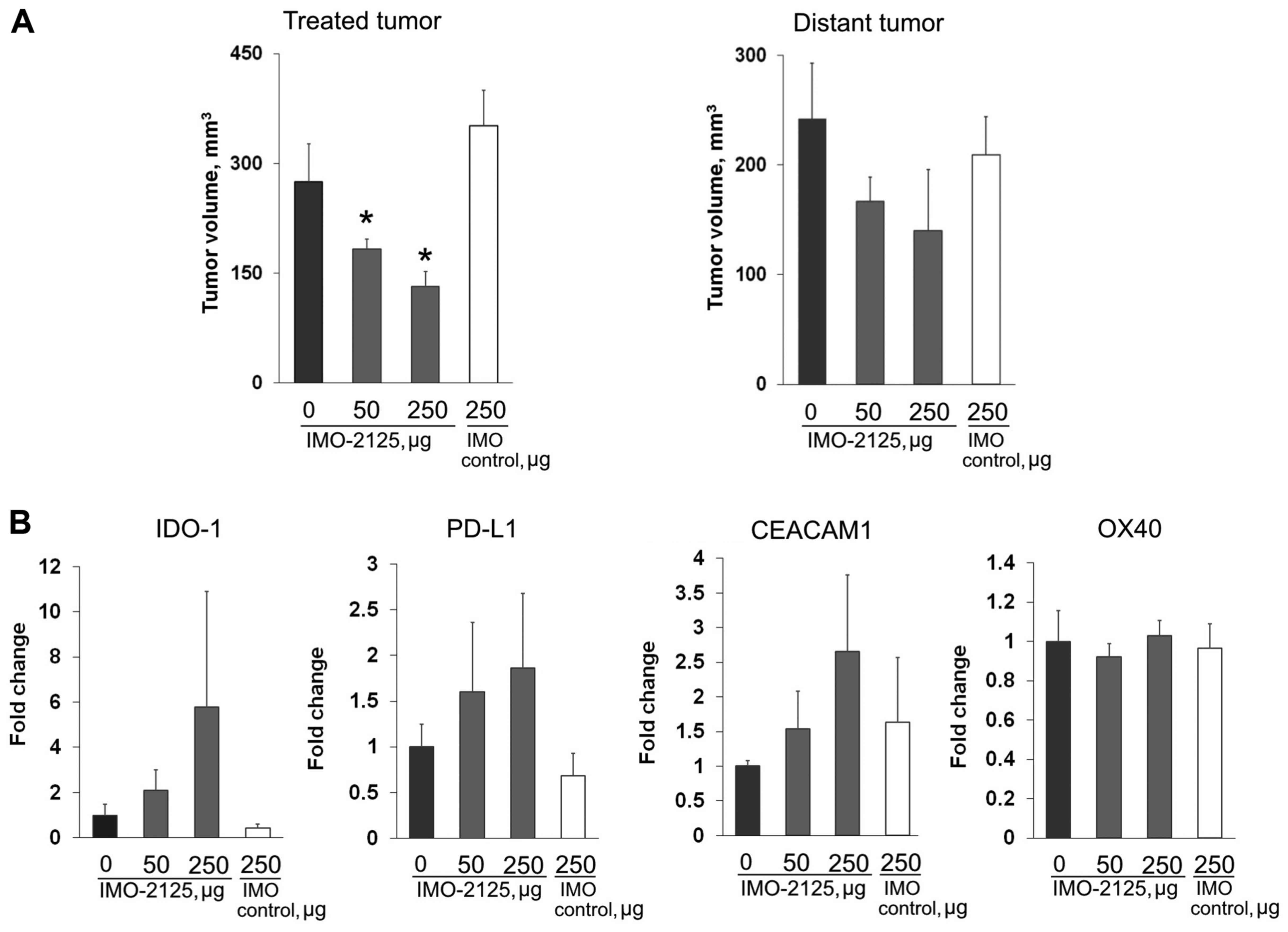|
1
|
Alexander W: The Checkpoint Immunotherapy
Revolution: What started as a trickle has become a flood, despite
some daunting adverse effects; New drugs, indications, and
combinations continue to emerge. PT. 41:185–191. 2016.
|
|
2
|
Fountzilas C, Patel S and Mahalingam D:
Review: Oncolytic virotherapy, updates and future directions.
Oncotarget. 8:102617–102639. 2017. View Article : Google Scholar : PubMed/NCBI
|
|
3
|
Yin J, Markert JM and Leavenworth JW:
Modulation of the intratumoral immune landscape by oncolytic herpes
simplex virus virotherapy. Front Oncol. 7:1362017. View Article : Google Scholar : PubMed/NCBI
|
|
4
|
Coley WB: The treatment of malignant
tumors by repeated inoculations of erysipelas. With a report of ten
original cases 1893 Clin Orthop Relat Res. 262:3–11. 1991.
|
|
5
|
Zbar B and Tanaka T: Immunotherapy of
cancer: Regression of tumors after intralesional injection of
living Mycobacterium bovis. Science. 172:271–273. 1971. View Article : Google Scholar : PubMed/NCBI
|
|
6
|
Cohen MH, Jessup JM, Felix EL, Weese JL
and Herberman RB: Intralesional treatment of recurrent metastatic
cutaneous malignant melanoma: A randomized prospective study of
intralesional Bacillus Calmette-Guerin versus intralesional
dinitrochloro-benzene. Cancer. 41:2456–2463. 1978. View Article : Google Scholar : PubMed/NCBI
|
|
7
|
Morton DL, Eilber FR, Holmes EC, Hunt JS,
Ketcham AS, Silverstein MJ and Sparks FC: BCG immunotherapy of
malignant melanoma: Summary of a seven-year experience. Ann Surg.
180:635–643. 1974. View Article : Google Scholar : PubMed/NCBI
|
|
8
|
Silverstein MJ, DeKernion J and Morton DL:
Malignant melanoma metastatic to the bladder. Regression following
intratumor injection of BCG vaccine. JAMA. 229:6881974. View Article : Google Scholar : PubMed/NCBI
|
|
9
|
Krown SE, Hilal EY, Pinsky CM, Hirshaut Y,
Wanebo HJ, Hansen JA, Huvos AG and Oettgen HF: Intralesional
injection of the methanol extraction residue of Bacillus
Calmette-Guerin (MER) into cutaneous metastases of malignant
melanoma. Cancer. 42:2648–2660. 1978. View Article : Google Scholar : PubMed/NCBI
|
|
10
|
Bier J, Kleinschuster S, Bier H and Rapp
H: Intratumor immunotherapy with BCG cell wall preparations:
Development of a new therapy approach for head-neck tumors. Arch
Otorhinolaryngol. 236:245–255. 1982.In German. View Article : Google Scholar
|
|
11
|
Bast RC Jr, Zbar B, Borsos T and Rapp HJ:
BCG and cancer (first of two parts). N Engl J Med. 290:1413–1420.
1974. View Article : Google Scholar : PubMed/NCBI
|
|
12
|
Bast RC Jr, Zbar B, Borsos T and Rapp HJ:
BCG and cancer. N Engl J Med. 290:1458–1469. 1974. View Article : Google Scholar : PubMed/NCBI
|
|
13
|
Shimada S, Yano O, Inoue H, Kuramoto E,
Fukuda T, Yamamoto H, Kataoka T and Tokunaga T: Antitumor activity
of the DNA fraction from Mycobacterium bovis BCG. II. Effects on
various syngeneic mouse tumors. J Natl Cancer Inst. 74:681–688.
1985.PubMed/NCBI
|
|
14
|
Yamamoto S, Yamamoto T, Nojima Y, Umemori
K, Phalen S, McMurray DN, Kuramoto E, Iho S, Takauji R, Sato Y, et
al: Discovery of immunostimulatory CpG-DNA and its application to
tuberculosis vaccine development. Jpn J Infect Dis. 55:37–44.
2002.PubMed/NCBI
|
|
15
|
Yu D, Kandimalla ER, Bhagat L, Tang JY,
Cong Y, Tang J and Agrawal S: 'Immunomers' - novel 3′-3′-linked CpG
oligodeoxyribonucleotides as potent immunomodulatory agents.
Nucleic Acids Res. 30:4460–4469. 2002. View Article : Google Scholar : PubMed/NCBI
|
|
16
|
Hemmi H, Takeuchi O, Kawai T, Kaisho T,
Sato S, Sanjo H, Matsumoto M, Hoshino K, Wagner H, Takeda K, et al:
A Toll-like receptor recognizes bacterial DNA. Nature. 408:740–745.
2000. View Article : Google Scholar : PubMed/NCBI
|
|
17
|
Krieg AM, Yi AK, Matson S, Waldschmidt TJ,
Bishop GA, Teasdale R, Koretzky GA and Klinman DM: CpG motifs in
bacterial DNA trigger direct B-cell activation. Nature.
374:546–549. 1995. View Article : Google Scholar : PubMed/NCBI
|
|
18
|
Mandl JN, Barry AP, Vanderford TH, Kozyr
N, Chavan R, Klucking S, Barrat FJ, Coffman RL, Staprans SI and
Feinberg MB: Divergent TLR7 and TLR9 signaling and type I
interferon production distinguish pathogenic and nonpathogenic AIDS
virus infections. Nat Med. 14:1077–1087. 2008. View Article : Google Scholar : PubMed/NCBI
|
|
19
|
Zhao Q, Temsamani J, Iadarola PL, Jiang Z
and Agrawal S: Effect of different chemically modified
oligodeoxynucleotides on immune stimulation. Biochem Pharmacol.
51:173–182. 1996. View Article : Google Scholar : PubMed/NCBI
|
|
20
|
Kandimalla ER, Yu D, Zhao Q and Agrawal S:
Effect of chemical modifications of cytosine and guanine in a
CpG-motif of oligonucleotides: Structure-immunostimulatory activity
relationships. Bioorg Med Chem. 9:807–813. 2001. View Article : Google Scholar : PubMed/NCBI
|
|
21
|
Yu D, Zhao Q, Kandimalla ER and Agrawal S:
Accessible 5′-end of CpG-containing phosphorothioate
oligodeoxynucleotides is essential for immunostimulatory activity.
Bioorg Med Chem Lett. 10:2585–2588. 2000. View Article : Google Scholar : PubMed/NCBI
|
|
22
|
Kandimalla ER, Bhagat L, Yu D, Cong Y,
Tang J and Agrawal S: Conjugation of ligands at the 5′-end of CpG
DNA affects immunostimulatory activity. Bioconjug Chem. 13:966–974.
2002. View Article : Google Scholar : PubMed/NCBI
|
|
23
|
Kandimalla ER, Bhagat L, Wang D, Yu D, Zhu
FG, Tang J, Wang H, Huang P, Zhang R and Agrawal S: Divergent
synthetic nucleotide motif recognition pattern: Design and
development of potent immunomodulatory oligodeoxyribonucleotide
agents with distinct cytokine induction profiles. Nucleic Acids
Res. 31:2393–2400. 2003. View Article : Google Scholar : PubMed/NCBI
|
|
24
|
Yu D, Kandimalla ER, Zhao Q, Bhagat L,
Cong Y and Agrawal S: Requirement of nucleobase proximal to CpG
dinucleotide for immunostimulatory activity of synthetic CpG DNA.
Bioorg Med Chem. 11:459–464. 2003. View Article : Google Scholar : PubMed/NCBI
|
|
25
|
Wang D, Li Y, Yu D, Song SS, Kandimalla ER
and Agrawal S: Immunopharmacological and antitumor effects of
second-generation immunomodulatory oligonucleotides containing
synthetic CpR motifs. Int J Oncol. 24:901–908. 2004.PubMed/NCBI
|
|
26
|
Damiano V, Caputo R, Bianco R, D'Armiento
FP, Leonardi A, De Placido S, Bianco AR, Agrawal S, Ciardiello F
and Tortora G: Novel toll-like receptor 9 agonist induces epidermal
growth factor receptor (EGFR) inhibition and synergistic antitumor
activity with EGFR inhibitors. Clin Cancer Res. 12:577–583. 2006.
View Article : Google Scholar : PubMed/NCBI
|
|
27
|
Damiano V, Caputo R, Garofalo S, Bianco R,
Rosa R, Merola G, Gelardi T, Racioppi L, Fontanini G, De Placido S,
et al: TLR9 agonist acts by different mechanisms synergizing with
bevacizumab in sensitive and cetuximab-resistant colon cancer
xenografts. Proc Natl Acad Sci USA. 104:12468–12473. 2007.
View Article : Google Scholar : PubMed/NCBI
|
|
28
|
Damiano V, Garofalo S, Rosa R, Bianco R,
Caputo R, Gelardi T, Merola G, Racioppi L, Garbi C, Kandimalla ER,
et al: A novel toll-like receptor 9 agonist cooperates with
trastuzumab in trastuzumab-resistant breast tumors through multiple
mechanisms of action. Clin Cancer Res. 15:6921–6930. 2009.
View Article : Google Scholar : PubMed/NCBI
|
|
29
|
Rosa R, Melisi D, Damiano V, Bianco R,
Garofalo S, Gelardi T, Agrawal S, Di Nicolantonio F, Scarpa A,
Bardelli A, et al: Toll-like receptor 9 agonist IMO cooperates with
cetuximab in K-ras mutant colorectal and pancreatic cancers. Clin
Cancer Res. 17:6531–6541. 2011. View Article : Google Scholar : PubMed/NCBI
|
|
30
|
Yu D, Putta MR, Bhagat L, Dai M, Wang D,
Trombino AF, Sullivan T, Kandimalla ER and Agrawal S: Impact of
secondary structure of toll-like receptor 9 agonists on interferon
alpha induction. Antimicrob Agents Chemother. 52:4320–4325. 2008.
View Article : Google Scholar : PubMed/NCBI
|
|
31
|
Rodriguez-Torres M, Ghalib RH, Gordon SC
and McHutchison JG: IMO-2125, a TLR9 agonist, induces immune
responses which correlate with reductions in viral load in null
responder HCV patients. Hepatology. 52:336A2010.
|
|
32
|
Kandimalla ER, Bhagat L, Wang D, Yu D,
Sullivan T, La Monica N and Agrawal S: Design, synthesis and
biological evaluation of novel antagonist compounds of Toll-like
receptors 7, 8 and 9. Nucleic Acids Res. 41:3947–3961. 2013.
View Article : Google Scholar : PubMed/NCBI
|
|
33
|
Wang M, Bronte V, Chen PW, Gritz L,
Panicali D, Rosenberg SA and Restifo NP: Active immunotherapy of
cancer with a nonreplicating recombinant fowlpox virus encoding a
model tumor-associated antigen. J Immunol. 154:4685–4692.
1995.PubMed/NCBI
|
|
34
|
Huang AY, Gulden PH, Woods AS, Thomas MC,
Tong CD, Wang W, Engelhard VH, Pasternack G, Cotter R, Hunt D, et
al: The immunodominant major histocompatibility complex class
I-restricted antigen of a murine colon tumor derives from an
endogenous retroviral gene product. Proc Natl Acad Sci USA.
93:9730–9735. 1996. View Article : Google Scholar : PubMed/NCBI
|
|
35
|
Touitou V, Daussy C, Bodaghi B, Camelo S,
de Kozak Y, Lehoang P, Naud MC, Varin A, Thillaye-Goldenberg B,
Merle-Béral H, et al: Impaired th1/tc1 cytokine production of
tumor-infiltrating lymphocytes in a model of primary intraocular
B-cell lymphoma. Invest Ophthalmol Vis Sci. 48:3223–3229. 2007.
View Article : Google Scholar : PubMed/NCBI
|
|
36
|
Livak KJ and Schmittgen TD: Analysis of
relative gene expression data using real-time quantitative PCR and
the 2(−ΔΔC(T)) method. Methods. 25:402–408. 2001. View Article : Google Scholar
|
|
37
|
Duluc D, Corvaisier M, Blanchard S, Catala
L, Descamps P, Gamelin E, Ponsoda S, Delneste Y, Hebbar M and
Jeannin P: Interferon-gamma reverses the immunosuppressive and
protumoral properties and prevents the generation of human
tumor-associated macrophages. Int J Cancer. 125:367–373. 2009.
View Article : Google Scholar : PubMed/NCBI
|
|
38
|
Greiner JW, Hand PH, Noguchi P, Fisher PB,
Pestka S and Schlom J: Enhanced expression of surface
tumor-associated antigens on human breast and colon tumor cells
after recombinant human leukocyte alpha-interferon treatment.
Cancer Res. 44:3208–3214. 1984.PubMed/NCBI
|
|
39
|
Boyer CM, Dawson DV, Neal SE, Winchell LF,
Leslie DS, Ring D and Bast RC Jr: Differential induction by
interferons of major histocompatibility complex-encoded and
non-major histo-compatibility complex-encoded antigens in human
breast and ovarian carcinoma cell lines. Cancer Res. 49:2928–2934.
1989.PubMed/NCBI
|
|
40
|
Schiavoni G, Mattei F and Gabriele L: Type
I interferons as stimulators of DC-mediated cross-priming: Impact
on anti-tumor response. Front Immunol. 4:4832013. View Article : Google Scholar
|
|
41
|
Joffre OP, Segura E, Savina A and
Amigorena S: Cross-presentation by dendritic cells. Nat Rev
Immunol. 12:557–569. 2012. View Article : Google Scholar : PubMed/NCBI
|
|
42
|
Nguyen KB, Salazar-Mather TP, Dalod MY,
Van Deusen JB, Wei XQ, Liew FY, Caligiuri MA, Durbin JE and Biron
CA: Coordinated and distinct roles for IFN-alpha beta, IL-12, and
IL-15 regulation of NK cell responses to viral infection. J
Immunol. 169:4279–4287. 2002. View Article : Google Scholar : PubMed/NCBI
|
|
43
|
Herberman RB, Ortaldo JR, Rubinstein M and
Pestka S: Augmentation of natural and antibody-dependent
cell-mediated cytotoxicity by pure human leukocyte interferon. J
Clin Immunol. 1:149–153. 1981. View Article : Google Scholar : PubMed/NCBI
|
|
44
|
Liu M, Zhou J, Chen Z and Cheng AS:
Understanding the epigenetic regulation of tumours and their
microenvironments: Opportunities and problems for epigenetic
therapy. J Pathol. 241:10–24. 2017. View Article : Google Scholar
|
|
45
|
Dunn J and Rao S: Epigenetics and
immunotherapy: The current state of play. Mol Immunol. 87:227–239.
2017. View Article : Google Scholar : PubMed/NCBI
|
|
46
|
Ott PA, Hodi FS and Robert C: CTLA-4 and
PD-1/PD-L1 blockade: New immunotherapeutic modalities with durable
clinical benefit in melanoma patients. Clin Cancer Res.
19:5300–5309. 2013. View Article : Google Scholar : PubMed/NCBI
|
|
47
|
Mahoney KM, Freeman GJ and McDermott DF:
The next immune-checkpoint inhibitors: PD-1/PD-L1 blockade in
melanoma. Clin Ther. 37:764–782. 2015. View Article : Google Scholar : PubMed/NCBI
|
|
48
|
Postow MA, Callahan MK and Wolchok JD:
Immune checkpoint blockade in cancer therapy. J Clin Oncol.
33:1974–1982. 2015. View Article : Google Scholar : PubMed/NCBI
|
|
49
|
Khalil DN, Smith EL, Brentjens RJ and
Wolchok JD: The future of cancer treatment: Immunomodulation, CARs
and combination immunotherapy. Nat Rev Clin Oncol. 13:273–290.
2016. View Article : Google Scholar : PubMed/NCBI
|
|
50
|
Serra-Bellver P, Valpione S and Lorigan P:
Sequential immunotherapy regimens-expect the unexpected. Lancet
Oncol. 17:854–855. 2016. View Article : Google Scholar : PubMed/NCBI
|
|
51
|
Weber JS, Gibney G, Sullivan RJ, Sosman
JA, Slingluff CL Jr, Lawrence DP, Logan TF, Schuchter LM, Nair S,
Fecher L, et al: Sequential administration of nivolumab and
ipilimumab with a planned switch in patients with advanced melanoma
(CheckMate 064): An open-label, randomised, phase 2 trial. Lancet
Oncol. 17:943–955. 2016. View Article : Google Scholar : PubMed/NCBI
|
|
52
|
Devaud C, John LB, Westwood JA, Darcy PK
and Kershaw MH: Immune modulation of the tumor microenvironment for
enhancing cancer immunotherapy. OncoImmunology. 2:e259612013.
View Article : Google Scholar : PubMed/NCBI
|
|
53
|
Arpaia N and Barton GM: Toll-like
receptors: Key players in antiviral immunity. Curr Opin Virol.
1:447–454. 2011. View Article : Google Scholar
|
|
54
|
Iwasaki A and Medzhitov R: Toll-like
receptor control of the adaptive immune responses. Nat Immunol.
5:987–995. 2004. View
Article : Google Scholar : PubMed/NCBI
|
|
55
|
Pardoll DM: The blockade of immune
checkpoints in cancer immunotherapy. Nat Rev Cancer. 12:252–264.
2012. View Article : Google Scholar : PubMed/NCBI
|
|
56
|
Ahmadzadeh M, Johnson LA, Heemskerk B,
Wunderlich JR, Dudley ME, White DE and Rosenberg SA: Tumor
antigen-specific CD8 T cells infiltrating the tumor express high
levels of PD-1 and are functionally impaired. Blood. 114:1537–1544.
2009. View Article : Google Scholar : PubMed/NCBI
|
|
57
|
Mellor AL, Baban B, Chandler PR, Manlapat
A, Kahler DJ and Munn DH: Cutting edge: CpG oligonucleotides induce
splenic CD19+ dendritic cells to acquire potent
indoleamine 2,3-dioxygenase-dependent T cell regulatory functions
via IFN Type 1 signaling. J Immunol. 175:5601–5605. 2005.
View Article : Google Scholar : PubMed/NCBI
|
|
58
|
Fallarino F and Puccetti P: Toll-like
receptor 9-mediated induction of the immunosuppressive pathway of
tryptophan catabolism. Eur J Immunol. 36:8–11. 2006. View Article : Google Scholar
|
|
59
|
Diab A, Haymaker C, Uemura M, Murthy R,
James M, Geib J, Cornfeld M, Swann S, Yee C, Wargo J, et al: A
phase 1/2 trial of intratumoral (i.t.) IMO-2125 (IMO) in
combination with checkpoint inhibitors (CPI) in PD-(L)1-refractory
melanoma. Ann Oncol. 28(Suppl 5): 1187P2017. View Article : Google Scholar
|
|
60
|
Haymaker C, Uemura M, Murthy R, James M,
Wang D, Brevard J, Swann S, Geib J, Cornfeld M, Chunduru S, et al:
Translational evidence of reactivated innate and adaptive immunity
with intratumoral IMO-2125 in combination with systemic checkpoint
inhibitors from a phase I/II study in patients with anti-PD-1
refractory metastatic melanoma. Cancer Res. 77(Suppl 13): 56522017.
View Article : Google Scholar
|















